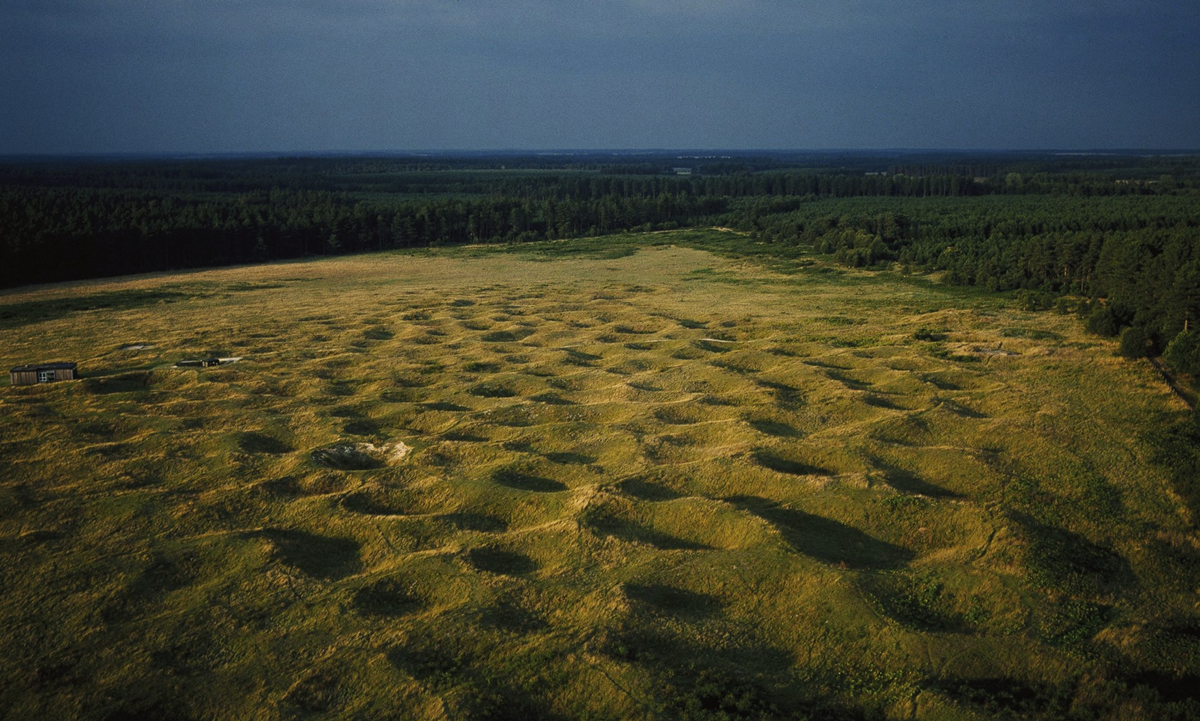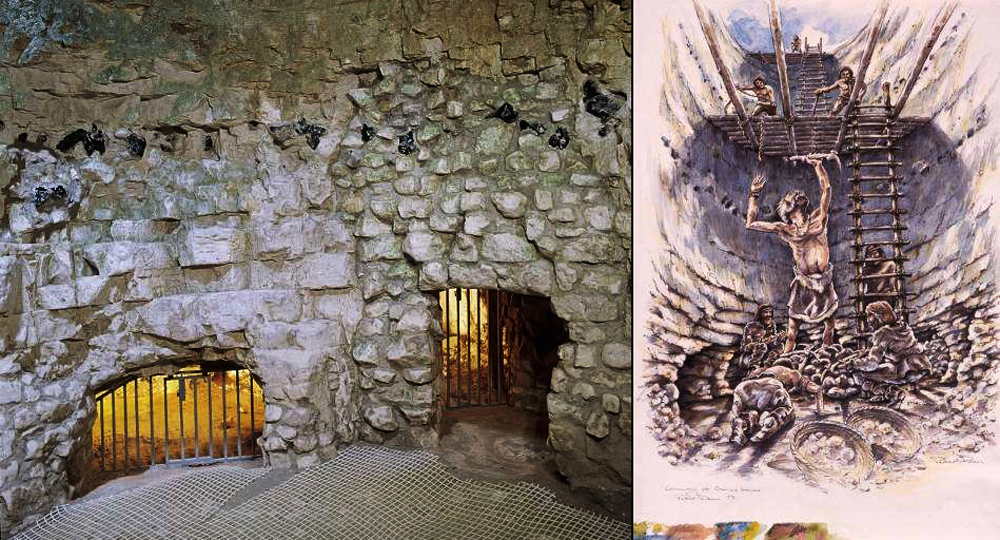


An article by Maev Kennedy on theguardian.com - Prehistoric Norfolk mine to open second pit to public - reports on new public access down into the 4,000-year-old site where Neolithic miners used antlers to hack out flint.

The remains of the ancient pits. Image: English Heritage/PA Wire
Members of the public will soon be allowed to explore, via ladders, winches and harnesses, the shafts and galleries cut deep under Norfolk heathland more than 4,000 years ago.
The surface landscape of Grime's Graves, with its numerous shallow depressions, was caused by the neolithic flint mines. The pits were sunk up to 13 metres deep, a labour-intensive process using antler picks.
New access to Grime's Graves flint mines in #Norfolk https://t.co/H51NRF9ftw #Neolithic pic.twitter.com/AcIzN3JSFG
— Bradshaw Foundation (@BradshawFND) March 6, 2017
Image: English Heritage/PA Wire
The name Grime's Graves has Anglo-Saxon origins, from long after the mines fell out of use as metal tools replaced flint. Some of the accessible hollows were used as burial grounds in the Iron Age. For the Normans the site was used to keep rabbits for their meat and skins, as the poor sandy soil was ideal for the animals warrens.

Images: English Heritage
In 1870 the site was excavated and identified as a Neolithic flint mine, yielding an almost indestructible jet-black flint. The work was initiated by William Greenwell, an Anglican priest and archaeology enthusiast.
Ritual deposits were discovered in the shafts including an axe made of greenstone from Cornwall and human and animal bones. Many of the artefacts are now in the British Museum.
Grime's Graves is just one of ten prehistoric flint mines in England, and it is the only one open to the public. Booking starts this week for visits by English Heritage members from April and for the general public from June.
English Heritage:
http://www.english-heritage.org.uk/visit/places/grimes-graves-prehistoric-flint-mine/
View the British Isles Prehistory Archive:
http://www.bradshawfoundation.com/british_isles_prehistory_archive/index.php
by Bradshaw Foundation
Monday 04 December 2023
by Bradshaw Foundation
Friday 30 June 2023
by Bradshaw Foundation
Thursday 06 April 2023
by Bradshaw Foundation
Thursday 24 November 2022
by Bradshaw Foundation
Tuesday 27 September 2022
by Bradshaw Foundation
Thursday 08 September 2022
by Bradshaw Foundation
Tuesday 19 July 2022
by Bradshaw Foundation
Monday 06 June 2022
by Bradshaw Foundation
Friday 11 March 2022
by Bradshaw Foundation
Wednesday 02 March 2022
by Bradshaw Foundation
Thursday 26 August 2021
by Bradshaw Foundation
Monday 16 August 2021
by Bradshaw Foundation
Tuesday 06 July 2021
by Bradshaw Foundation
Thursday 06 May 2021
by Bradshaw Foundation
Thursday 06 May 2021
by Bradshaw Foundation
Tuesday 16 March 2021
by Bradshaw Foundation
Monday 04 December 2023
by Bradshaw Foundation
Friday 30 June 2023
by Bradshaw Foundation
Thursday 06 April 2023
by Bradshaw Foundation
Thursday 24 November 2022
by Bradshaw Foundation
Tuesday 27 September 2022
by Bradshaw Foundation
Thursday 08 September 2022
by Bradshaw Foundation
Tuesday 19 July 2022
by Bradshaw Foundation
Monday 06 June 2022
by Bradshaw Foundation
Friday 11 March 2022
by Bradshaw Foundation
Wednesday 02 March 2022
by Bradshaw Foundation
Thursday 26 August 2021
by Bradshaw Foundation
Monday 16 August 2021
by Bradshaw Foundation
Tuesday 06 July 2021
by Bradshaw Foundation
Thursday 06 May 2021
by Bradshaw Foundation
Thursday 06 May 2021
by Bradshaw Foundation
Tuesday 16 March 2021
Friend of the Foundation











